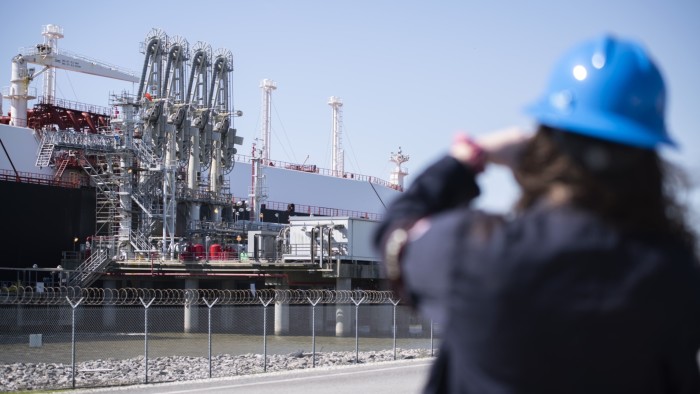Unlock the White House Watch newsletter for free
Your guide to what the 2024 US election means for Washington and the world
US liquefied natural gas exports are emerging as an early bargaining chip in a potential deal between Brussels and Washington that would send more energy to Europe in exchange for dissuading Donald Trump from levying hefty import tariffs on EU companies.
European officials have said increased imports of US LNG could play a role in weaning the continent off its continued reliance on Russian imports while also helping to assuage Trump’s concerns over the trade deficit.
For US developers, the expansion of the European market, coupled with Trump’s promise to scrap a pause on export licenses as soon as he takes office, could open the door to rapid growth over the coming four years.
“We look forward to working with the incoming Trump administration to cement America’s role as the world’s leading supplier of clean liquefied natural gas,” said Michael Sabel, chief executive of Venture Global, a leading US LNG developer.
“In recent years, Europe has moved swiftly to build out the necessary infrastructure needed to support a surge of LNG into the region and with the necessary policy support and regulatory certainty the United States is well positioned to meet that long-term demand,” he said.
Developers are banking that the EU’s ongoing efforts to wean itself off Russian gas will be turbocharged under the second Trump administration. Share prices of LNG companies in the US — already the world’s biggest supplier — have surged over the past week.
“We can supply — that’s the good thing about natural gas reserves in America,” said Harold Hamm, the founder of Continental Resources and Trump’s most prominent industry supporter, adding that US industry stood ready to increase exports to the EU and wean the continent off its lingering reliance on Russian gas. Hamm said he had spoken to Trump’s transition team and producers about energy policy.
“I would expect that the LNG permit pause is going to go within the first couple of days of the Trump administration,” said Mike Sommers, chief executive of the American Petroleum Institute, speaking about President Joe Biden’s moratorium on new licences while the Department of Energy carried out a cost-benefit analysis of the sector’s growth.
Biden has had a tumultuous relationship with the oil and gas industry. Still, US natural gas production hit record highs during his presidency, pushing spot prices to 20-year lows and prompting the industry to seek more overseas LNG customers.
US LNG could be a chief beneficiary of trade talks between Washington and Brussels, according to European Commission president Ursula von der Leyen, who last week expressed an appetite to increase imports from the country.
“We still get a lot of LNG from Russia, and why not replace it with American LNG, which is cheaper for us and brings down our energy prices,” she said after a call with Trump. “This is something that we can get into a discussion, also [where] the trade deficit is concerned.”
As the EU faced dwindling pipeline gas supplies from Russia following its full-scale invasion of Ukraine, the bloc stepped up imports of LNG from around the world to make up for the shortfall. The US was the primary supplier of LNG, and now accounts for about 40 per cent of the EU’s import of the super-chilled fuel, according to Kpler, a commodity data group.
“Quite frankly, we have an increasingly important role in serving our allies abroad. And LNG is a very, very important tool of American foreign policy,” said Jeffrey Martin, chief executive of Sempra, a leading US LNG developer, on an analyst call following the election result.
Following Russia’s invasion in February 2022, Biden and von der Leyen announced a strategic pact under which European companies would aim to guarantee demand for US LNG in a bid to drive construction of greater export capacity. But analysts note that Brussels has limited powers in committing to imports of US LNG.
“Unless the EU completely bans Russian LNG imports — something that all EU member states would have to sign off on — it is hard to see how the EU’s executive arm can have much sway over where Europe buys its LNG from,” said Natasha Fielding, head of European gas pricing at Argus, a pricing agency.
Source link









